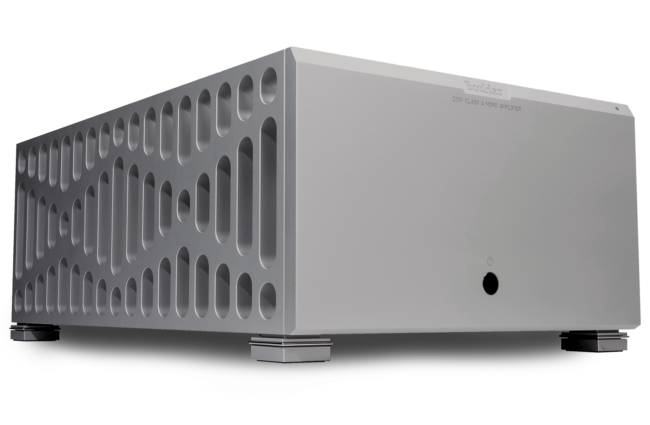Boulder 2150 Specifications:
Every electronic circuit within the 2150 Mono Amplifier is entirely new and all technological changes are primarily derived from Boulder’s 3050 Mono Amplifier.
Among the numerous changes and advances encompassed by the 2150 are:
· Pure linear Class A operation. Bias current is actively monitored and adjusted in order to increase efficiency and reduce wasted radiated heat energy.
· A new, high efficiency, microprocessor controlled standby mode reduces power consumption when engaged.
· All electronic circuits and electronics are now surface-mount designs manufactured on Boulder’s own surface-mount manufacturing machines and ovens to increase reliability, consistency and optimized ground planing while at the same time reducing signal path length, PCB capacitance and noise radiation.
· Gain stages within the 2150 are Boulder’s proprietary 99H2, which is unique to the 2100 Series amplifiers. 99H2 gain stages feature surface-mount electronic design and feature a new machined and potted housing to increase thermal stability.
· The 2150 utilizes 80 output devices, 48 filter capacitors and 3 toroidal power transformers to generate power output of up to 1,000 watts into any load, enabling massive current swings and the ability to drive any loudspeaker to realistic audio levels.
· Full Ethernet IP control capability and a 12V trigger minijack connection for use with advanced control systems and triggered home cinema installations.
· Units will be available shipped at operating voltages of 100V, 120V and 240VAC.
· A new and complete array of protection and status monitoring circuits are continuously active.
· The physical and cosmetic changes in the 2150 include a slightly revised front panel and a new clear anodized top, bottom and rear panel with no powder coating or paint. All rear panel markings and indications are now machine engraved. Metal casework is cut on Boulder’s own four CNC machining centers.
PEAK POWER, 8 OHMS
1000W
PEAK POWER, 4 OHMS
2000W
PEAK POWER, 2 OHMS
4000W
THD, 8 OHMS, 1000W
20-2 kHz: 0.0008%, 20 kHz: 0.0035%
THD, 4 OHMS, 1000W
20-2 kHz: 0.0009%, 20 kHz: 0.0045%
THD, 2 OHMS, 1000W
20-2 kHz: 0.0014%, 20 kHz: 0.0090%
FREQUENCY RESPONSE
-3dB @ 0.015 Hz, 200 kHz
EQUIVALENT INPUT NOISE (EIN), 20 KHZ BW
1.5 μV
MAGNITUDE RESPONSE, 20 TO 20 KHZ
+0.00, -0.04 dB
MAGNITUDE RESPONSE, -3 DB AT
0.015 Hz, 200 kHz
VOLTAGE GAIN
26 dB
INPUT IMPEDANCE
Balanced: 200kΩ,
Unbalanced 100kΩCOMMON MODE REJECTION (BALANCED ONLY)
60 Hz: 90 dB,
10 kHz: 70 dBINPUTS
3-pin balanced XLR
OUTPUT CONNECTORS
2 sets of 6 mm / .250-inch wingscrews
WEIGHT
Amplifier: 220 lbs. (99.8 kg),
Shipping: 319 lbs. (144.7 kg)POWER REQUIREMENTS
100, 110-120, 220-240 VAC, 50-60 Hz
Please find reviews below:
” The Absolute Sound ” Magazine Review
” The Boulder 2150 amplifier is as engineering marvel. It offers smooth, sesuctive and powerful sound that places it in the very highest echelon of solid-state amplification, perhaps supressed only by it’s big brother in the Boulder 3000 series. With 1000 Watt Class A Power on call, this amplifier can pretty much deliver limitless power, but it never comes close to running hot as Boulder employs advanced circuitry to deploy only as many watts as the music demands. The Most remarkable aspect of the 2150 is it’s control – the softest passage is delineated with what appears to be the utmost timbral fidelity. Cymbal swishes hover in the air for what seems like an eternity. And the ease with which you can follow a bass line when delivered by the 2150 is distinct pleasure. Does it breach the tube vs solid-state devide? No. The texture and dimensionality supplied by tubes remain a separate province. But the Boulder builds on the many virtues of solid-state to provide an amazingly realistic reproduction of recorded sound” TAS






